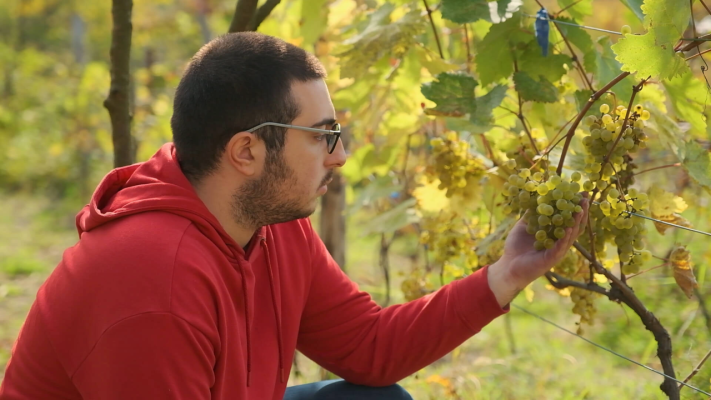Georgia’s 8,000 year-old wine industry gets a real boost in Racha

With over 8,000 years of rich wine-making traditions, Georgia is often called the “Cradle of Wine.” Although it’s a relatively small wine producer, Georgia’s worldwide exports are growing every year. In response to international demand, more and more Georgian winemakers are turning to organic wine making. Some vineyards are well-prepared, while others are lacking both knowledge and equipment.
This is where the support from the EU, Sweden and Austria in the frame of the GRETA project has come in, to help Georgia’s organic wine makers boost production and prepare to enter international markets.
Continuing ancestral traditions
This particular story begins back in 1887 when Zurab Maisashvili, a young engineer from the mountainous Racha region decided to put all his savings into his homeland. He bought a large parcel of land and built a traditional house for his family and a wine cellar that would later hold volumes of Georgian wine. After he died in 1919, his children continued Maisashvili’s work. But soon came the bolsheviks and the Soviet Union took away most of his property, leaving the family with a very small part of its many hectares.
Nearly a century later, another Zurab Maisashvili, the famous entrepreneur’s descendant, went back to his family home in the village of Tsesi in the Racha region. The former policeman and his wife, a retired doctor, decided to rebuild what was once lost: the family property, the land and, of course, the wine cellar. Their wine quickly returned its initial name and appreciation revived for its distinct aroma and unique characteristics.
The newest era in this family’s history came with the youngest Zurab Maisashvili who, after finishing high school, decided to continue the path of his ancestors. In 2018, at the very young age of 18, he won a small grant and together with his cousin, Tornike Maisashvili, started to produce delicious local wine called Gvinuka.
Gvinuka is the youngest Maisashvili’s plan to revive the forgotten and rare vine varieties in Racha-Lechkhumi and Kvemo Svaneti. Currently, he is producing white and red organic dry wines made from Rachuli Tetra and Rachuli Dzelshavi.
Soon the company increased the number of bottles produced because it was able to start selling in various shops and restaurants in Georgia. By 2019, Gvinuka depended on local sales. And that’s when the pandemic hit in Spring of 2020 and hotels and restaurants around the country were forced to close down.
“We could not expand production the way we had planned, and the numbers showed it,” recalls Maisashvili.
At this critical point, the company found out about the support from the EU as part of its EU4Business Initiative, Sweden and Austria in the frame of the GRETA project and was able to get financing. In November 2020, Gvinuka acquired wine cisterns and wine processing machinery from Italy, a winepress and other equipment.
“Since we got this equipment, production has quadrupled,” says Zurab Maisashvili. “Before the support, we were producing a maximum of 3,000 bottles a year. Now we can make over 10,000.”
At first, the company offered only two types of wine, but with more equipment in place, they can now offer four different varieties. With the technical and financial support from the EU4Business, Sweden and Austria in the frame of the GRETA project, they also started the process of bio certification. This will allow Gvinuka to reach more customers in different markets, especially in Europe. Reports show that there has been a worldwide increase in the consumption and production of organic wines, with the EU currently the largest producer. Today, wine lovers can find Gvinuka wines in shops in Belgium and Netherlands. Maisashvili hopes to enter the Czech market this summer.
Nor do plans for Gvinuka end here. The young founders want to establish a wine-tasting area right where the wine is made, in the village of Tsesi. Old Zurab Maisashvili’s Ode, a late 19th century residence is now a cultural heritage monument. The property boasts an orchard, including century-old pear trees, to the north, and a vineyard to the south. Young Maisashvili thinks that the place has enormous potential for attracting tourists, especially wine-loving ones, to the village while increasing demand for high-quality, delicious wines from the Racha region.
***
GRETA | Green Economy: Sustainable Mountain Tourism and Organic Agriculture in Georgia’ is supported by the European Union, Austria and Sweden, and is implemented in Georgia by the Austrian Development Agency. The project aims to facilitate the improvement of the business environment and increase opportunities for generating additional income for the Georgian economy in two important sectors, mountain tourism and organic agriculture. The project is implemented in close cooperation with the local government and involves the regions of Samegrelo-Zemo Svaneti, Racha-Lechkhumi-Kvemo Svaneti and upper Imereti, where the entrepreneurs are involved from the municipalities of Mestia, Lentekhi, Tsageri, Oni, Ambrolauri, Sachkhere, Chiatura and Tkibuli. Those interested can obtain full information from the project web page – www.gretaproject.ge